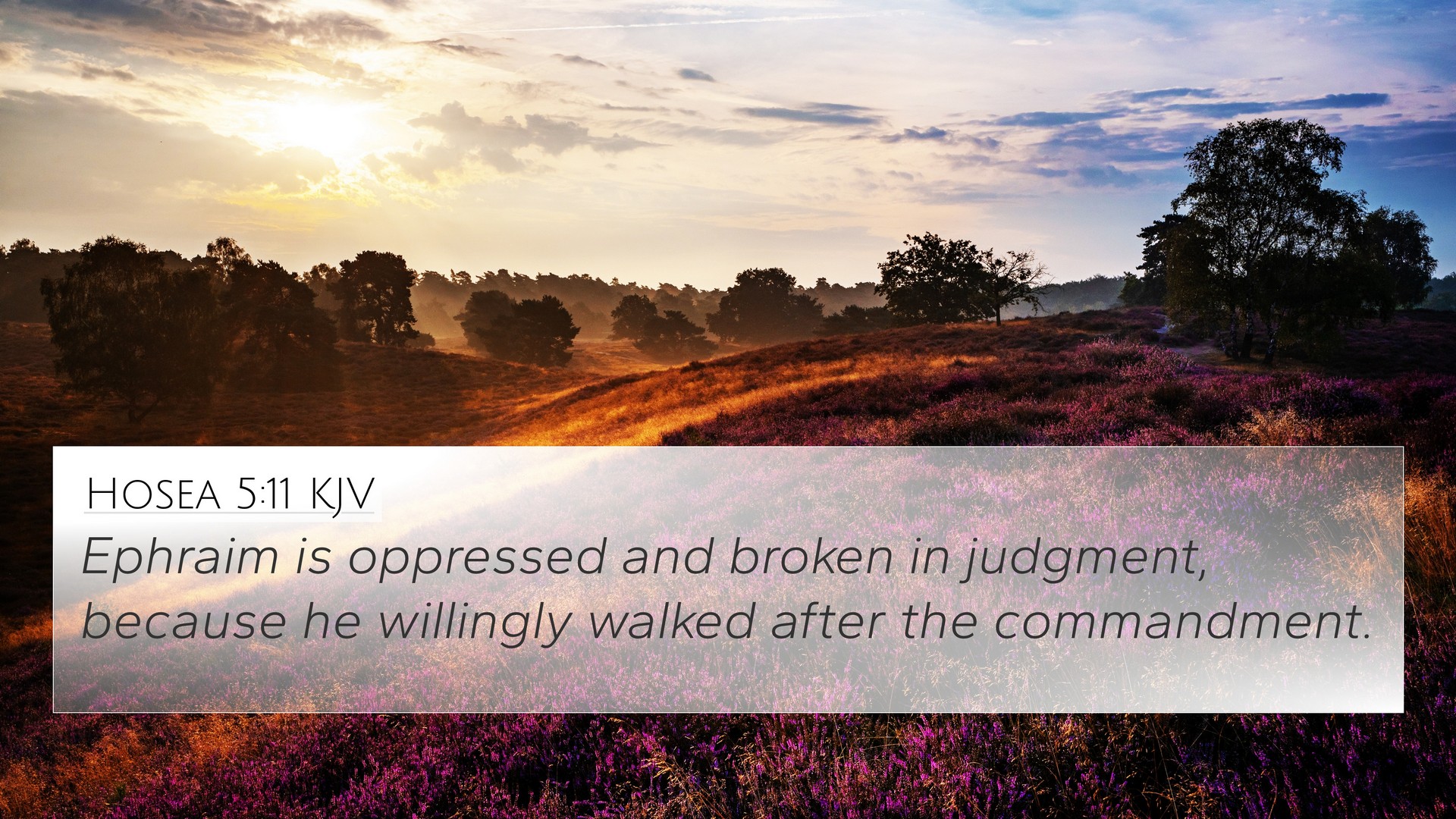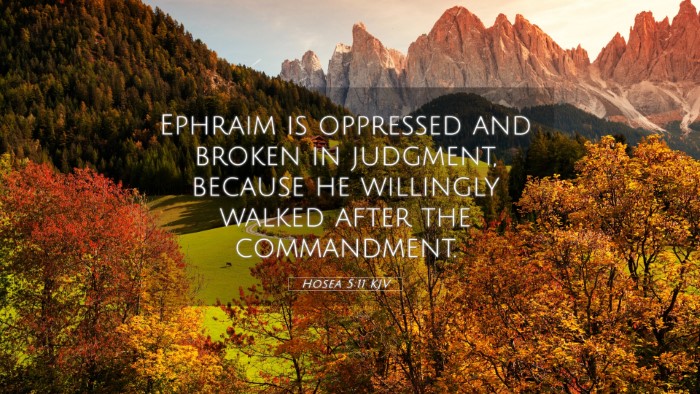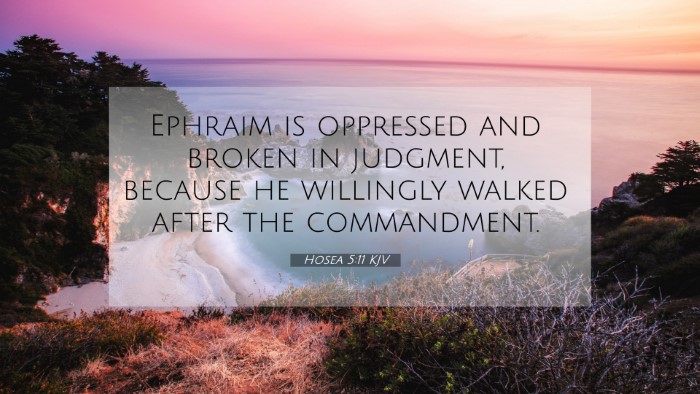Old Testament
Genesis Exodus Leviticus Numbers Deuteronomy Joshua Judges Ruth 1 Samuel 2 Samuel 1 Kings 2 Kings 1 Chronicles 2 Chronicles Ezra Nehemiah Esther Job Psalms Proverbs Ecclesiastes Song of Solomon Isaiah Jeremiah Lamentations Ezekiel Daniel Hosea Joel Amos Obadiah Jonah Micah Nahum Habakkuk Zephaniah Haggai Zechariah MalachiHosea 5:11 Similar Verses
Hosea 5:11 Cross References
Ephraim is oppressed and broken in judgment, because he willingly walked after the commandment.
Uncover the Rich Themes and Topics of This Bible Verse
Listed below are the Bible themes associated with Hosea 5:11. We invite you to explore each theme to gain deeper insights into the Scriptures.
Hosea 5:11 Cross Reference Verses
This section features a detailed cross-reference designed to enrich your understanding of the Scriptures. Below, you will find carefully selected verses that echo the themes and teachings related to Hosea 5:11 KJV. Click on any image to explore detailed analyses of related Bible verses and uncover deeper theological insights.
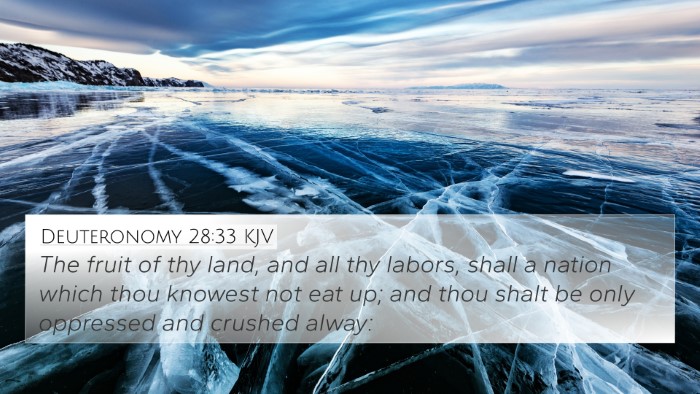
Deuteronomy 28:33 (KJV) »
The fruit of thy land, and all thy labors, shall a nation which thou knowest not eat up; and thou shalt be only oppressed and crushed alway:
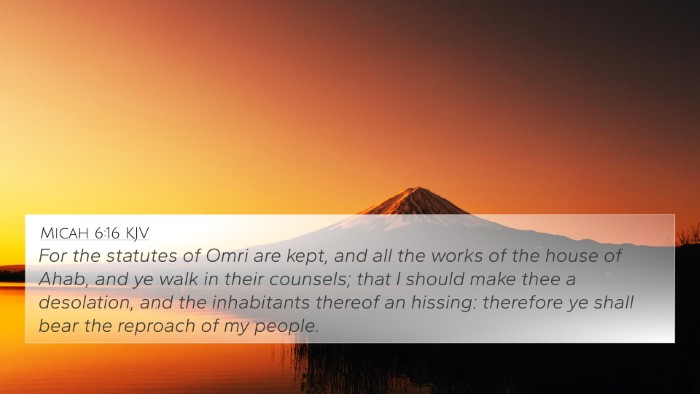
Micah 6:16 (KJV) »
For the statutes of Omri are kept, and all the works of the house of Ahab, and ye walk in their counsels; that I should make thee a desolation, and the inhabitants thereof an hissing: therefore ye shall bear the reproach of my people.

1 Kings 12:26 (KJV) »
And Jeroboam said in his heart, Now shall the kingdom return to the house of David:
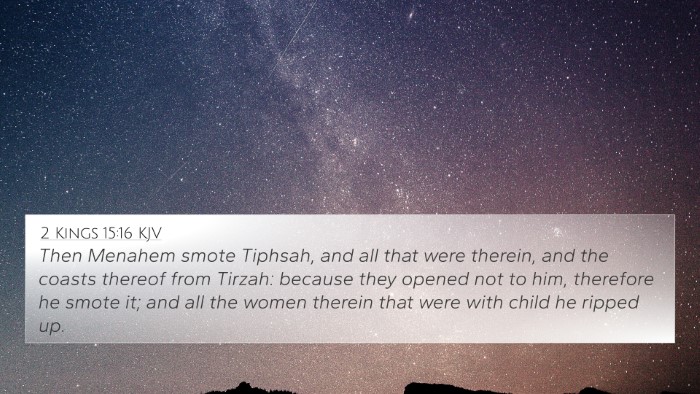
2 Kings 15:16 (KJV) »
Then Menahem smote Tiphsah, and all that were therein, and the coasts thereof from Tirzah: because they opened not to him, therefore he smote it; and all the women therein that were with child he ripped up.

2 Kings 15:29 (KJV) »
In the days of Pekah king of Israel came Tiglathpileser king of Assyria, and took Ijon, and Abelbethmaachah, and Janoah, and Kedesh, and Hazor, and Gilead, and Galilee, all the land of Naphtali, and carried them captive to Assyria.
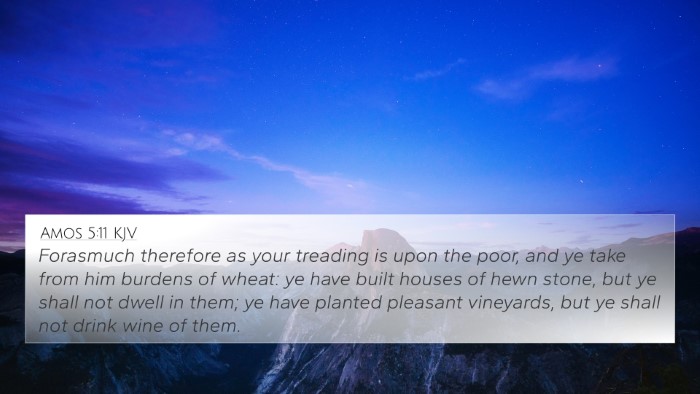
Amos 5:11 (KJV) »
Forasmuch therefore as your treading is upon the poor, and ye take from him burdens of wheat: ye have built houses of hewn stone, but ye shall not dwell in them; ye have planted pleasant vineyards, but ye shall not drink wine of them.
Hosea 5:11 Verse Analysis and Similar Verses
Understanding Hosea 5:11
Hosea 5:11 states: "Ephraim is oppressed and broken in judgment, because he willingly walked after the commandment." This verse captures the essence of Ephraim's spiritual and moral decay due to persistent disobedience to God's commandments.
Summary of Biblical Context
The Book of Hosea focuses on God’s relationship with His people, portraying Israel's unfaithfulness through Hosea's personal experiences. This particular verse highlights Ephraim, representing the northern kingdom of Israel, as facing consequences for their actions that reflect God’s judgment.
Commentary Insights
- Matthew Henry: Henry emphasizes that Ephraim's oppression is due to its own choices, illustrating a principle that divine judgment follows human disobedience. He notes that the spiritual blindness led the people to follow their own commandments instead of God's.
- Albert Barnes: Barnes draws attention to the phrase "willingly walked," indicating that Ephraim's sin was deliberate. He explains that the oppression they face is a result of their own sinful paths, which they chose rather than seeking righteousness.
- Adam Clarke: Clarke elaborates on the emotional and social turmoil within Ephraim, pointing to their broken state in judgment. He also indicates the broader implications of disobedience and its consequences on society as a whole.
Thematic Connections
This verse functions as a critical point for understanding the nature of sin, judgment, and repentance in scripture. It reveals the relationship between choices made by the people and their resultant suffering.
Cross-References
Hosea 5:11 is related to several other scriptures that highlight similar themes of disobedience, judgment, and the need for repentance:
- Isaiah 30:1-3: Reflects on the consequences of seeking refuge in human solutions rather than divine guidance.
- Jeremiah 5:6: Discusses the inevitable downfall due to the people's rebellion, akin to Ephraim's oppression.
- Ezekiel 18:30: Calls for repentance to avoid judgment, paralleling Ephraim's need for turning back to God.
- Hosea 8:3: Mentions the rejection of the Lord's commandments, leading to judgment similar to what Ephraim faces.
- James 1:15: Illustrates how sin leads to death, correlating with the outcomes of Ephraim's choices.
- Proverbs 1:24-28: Warns of the consequences of ignoring wisdom, which is echoed in Ephraim's oppression.
- Galatians 6:7: States that one reaps what one sows, emphasizing the principle seen in Hosea’s warning.
- Romans 1:21-23: Discusses the consequences of failing to honor God and the resulting futile thinking.
- Revelation 3:19: Calls for repentance, resonating with the themes found in God's message to Ephraim.
- Psalm 107:10-11: Speaks of those in darkness due to rebellion, much like Ephraim's state.
Applying Cross-Referencing Techniques
Understanding Hosea 5:11 in conjunction with these cross-references provides deeper clarity on the themes of disobedience and divine judgment. Here are some tools for Bible cross-referencing that can help in further study:
- Bible Concordance: A useful tool to find related verses quickly.
- Bible Cross-reference Guide: Provides a systematic way to explore scriptures that correlate with one another.
- Cross-reference Bible Study: This method allows for an organized study of linked themes and verses.
- Bible Chain References: A technique for linking verses that discuss similar concepts or teachings.
Exploring Inter-Biblical Dialogue
When examining the interconnections between Old and New Testament scriptures, Hosea 5:11 offers rich material for reflection on disobedience and its consequences. For instance, the New Testament’s message on repentance and sin provides valuable insights and parallels to the warnings conveyed in Hosea.
Conclusion
Hosea 5:11 serves as a powerful reminder of the repercussions of neglecting divine commandments. By utilizing comparative Bible verse analysis and Bible cross-reference systems, believers can develop a more nuanced understanding of scripture, enabling them to draw meaningful connections between various texts and themes.
For those looking to deepen their study, investigating the connections between these verses can foster spiritual growth and awareness of God's continuous calling towards repentance and faithfulness.
